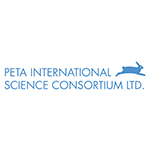PETA INTERNATIONAL SCIENCE CONSORTIUM

The PETA International Science Consortium works with international regulatory bodies and expert panels to develop and standardise in vitro nanotechnology testing strategies and promotes the implementation of these nonanimal approaches. In this capacity, the Consortium is a member of the US Technical Advisory Group to ISO/TC 229 Nanotechnologies and, through the International Council on Animal Protection in OECD Programmes, participates in the Organisation for Economic Co-operation and Development Working Party for Manufactured Nanomaterials. The Consortium also held a workshop on alternative methods for assessing the inhalation toxicity of nanomaterials in 2015 and subsequently funded the development of a 3D model of the human lower respiratory tract and an in vitro system to predict the development of pulmonary fibrosis.
The PETA International Science Consortium is collaborating with Health Canada to develop an adverse outcome pathway (AOP) for lung fibrosis. The AOP entitled ‘Secretion of inflammatory cytokines leading to lung fibrosis’ is available on the AOP Wiki. A manuscript on this work is currently under preparation. We have also hosted workshops and webinars and donated hundreds of thousands of dollars of equipment to advance in vitro inhalation toxicity testing
ROLE IN THE PROJECT:
To advise and contribute towards the task of applying adverse outcome pathway methodology to link physicochemical properties of nanomaterials to health and environmental effects.
